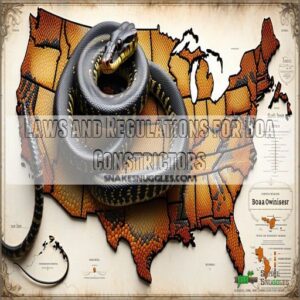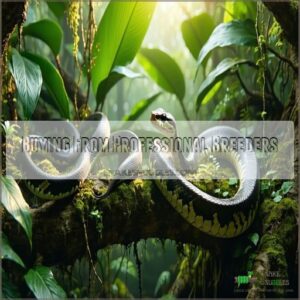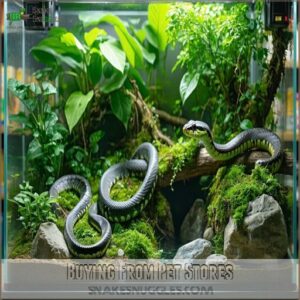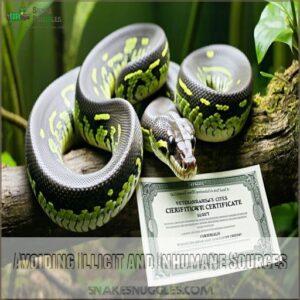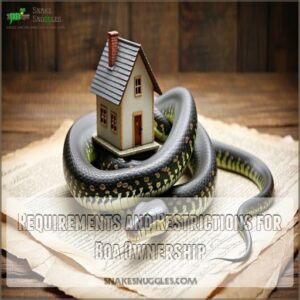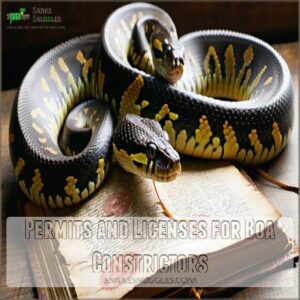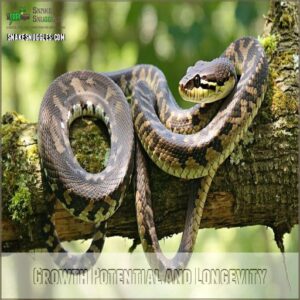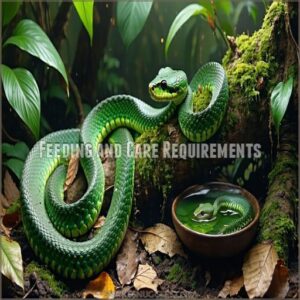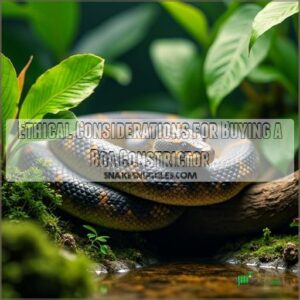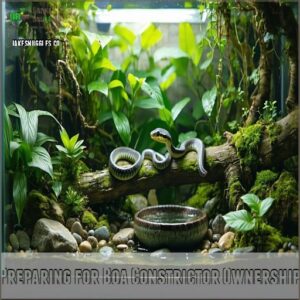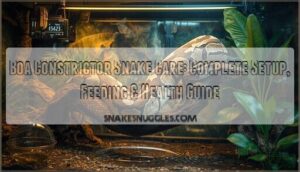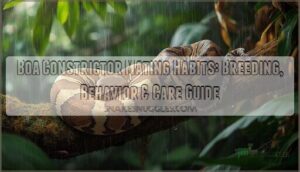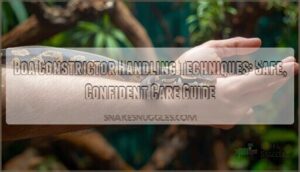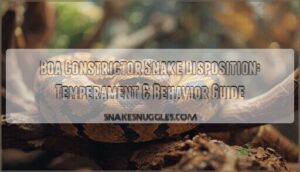This site is supported by our readers. We may earn a commission, at no cost to you, if you purchase through links.
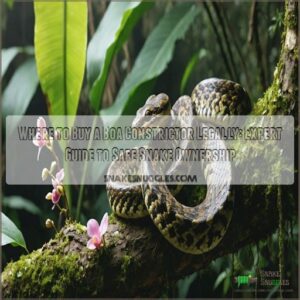
Once you confirm they’re allowed, look for reputable breeders or specialty pet stores licensed to sell captive-bred boas. Captive-bred snakes are healthier, easier to handle, and sidestep the ethical and legal complications of wild-caught ones.
Avoid sketchy sellers—it’s not worth the fines or ecological impact. And don’t forget permits if your area requires them.
Owning a boa is a commitment, so plan ahead and stay legal!
Table Of Contents
- Key Takeaways
- Laws and Regulations for Boa Constrictors
- Where to Buy a Boa Constrictor Legally
- Requirements and Restrictions for Boa Ownership
- Permits and Licenses for Boa Constrictors
- Understanding Boa Constrictors as Pets
- Ethical Considerations for Buying a Boa Constrictor
- Preparing for Boa Constrictor Ownership
- Frequently Asked Questions (FAQs)
- Conclusion
Key Takeaways
- Check your local laws to confirm boa constrictor ownership is legal in your area, as regulations vary widely by state or country.
- Always buy from reputable breeders or licensed pet stores offering captive-bred snakes to ensure a healthier and more ethical purchase.
- Avoid shady sellers or wild-caught boas to steer clear of legal fines, health risks, and ecological harm.
- Secure any necessary permits and prepare a suitable enclosure with proper temperature, humidity, and secure locks before bringing a boa home.
Laws and Regulations for Boa Constrictors
You’ll need to check your local laws before bringing home your new scaly friend, as regulations for boa constrictors vary widely across countries and states.
While places like Texas and Minnesota allow unrestricted ownership, other locations like Hawaii and New York have completely banned these impressive snakes.
Countries Where Boa Constrictors Are Legal as Pets
You’ll find snake ownership laws vary greatly worldwide.
In the United States, most states allow boa constrictors with proper exotic animal permits. The United Kingdom welcomes these reptiles with specific licensing requirements, while Canada’s pet snake stores operate under provincial regulations.
European Union members generally permit ownership, though international trade laws and wildlife conservation efforts influence local restrictions.
Prospective boa constrictor owners should research the cost to own boa constrictors to confirm they can provide the necessary care and resources. Before visiting reptile pet stores, always check your area’s current regulations.
States With Laws Prohibiting Boa Constrictor Ownership
While many areas welcome boa constrictors as pets, several states maintain strict prohibitions.
Hawaii’s unique ecosystem protection laws ban them entirely to prevent invasive species threats. New York’s 2019 wildlife preservation act also restricts boa constrictor ownership, citing owner liability concerns.
For those who can legally own a boa constrictor, purchasing from reptile breeders is often recommended to guarantee the snake is healthy and well-cared for.
Before getting your heart set on a new scaly friend, check your local snake ownership laws and reptile ownership regulations carefully to avoid disappointment.
Where to Buy a Boa Constrictor Legally
Finding a legal and reliable source for purchasing a boa constrictor guarantees both your compliance with the law and the snake’s well-being.
You’ll need to focus on reputable breeders or licensed establishments to avoid supporting unethical practices or breaking regulations.
Buying From Professional Breeders
When looking for boa constrictor breeders, focus on reputation. Captive bred benefits include healthier, more docile snakes, reducing invasive risks.
A professional breeder network typically offers a snake health guarantee and support. Always prioritize responsible breeding practices, taking cues from experienced owners of exotic snakes like the Rainbow Boa Care.
Whether at reptile expos or checking reptile breeders online, research certifications before you buy boa constrictor online or find a boa constrictor for sale locally to ensure healthier, more docile snakes and a snake health guarantee.
Buying From Pet Stores
Snake pet stores or reptile stores near me can seem like an easy choice, but always check store regulations and their accountability.
Look for boa constrictors for sale housed in clean, secure environments, adhering to animal welfare standards. Many stores also comply with sales restrictions.
You can also research local options through online directories for reptile stores near to find a reputable seller.
Avoid rushing—ensure you’re buying a healthy boa constrictor, not risking future headaches, and remember to check for a store with animal welfare standards.
Avoiding Illicit and Inhumane Sources
Don’t fall for cheap boa constrictor prices from shady “boa constrictor for sale near me” listings.
Reptile smuggling rings and inhumane captivity often hide behind these deals, violating wildlife trafficking laws like the Lacey Act.
Ethical sourcing methods, such as trusted boa constrictor breeders near me, help combat black market risks.
Avoid fueling illegal wildlife trafficking; choose responsibly bred boas.
Requirements and Restrictions for Boa Ownership
Owning a boa constrictor isn’t just about buying the snake—it’s about meeting legal requirements.
You’ll need to research local rules, secure permits.
You’ll also need to confirm your new pet has a safe, comfortable home, meeting ethical and care requirements.
Researching Local Laws and Regulations
Knowing boa constrictor laws in your area is essential.
Local ordinances, reptile laws, and exotic pet regulations vary by jurisdiction. Contact enforcement agencies to review permit requirements and confirm compliance checks.
Ignoring animal regulations can lead to hefty fines or confiscation. Always check updated boa constrictor laws before purchasing to avoid legal headaches and guarantee smooth ownership.
Obtaining Necessary Permits and Licenses
Getting boa constrictor permits means traversing the permit application process carefully.
You’ll need to pay attention to the license fees structure, including renewal costs, and understand permit renewal policies to dodge issues later.
Wildlife permits often outline specific rules, like license revocation reasons or permit transfer rules, so double-check details to confirm you’re fully set before owning your snake legally.
Providing Suitable Housing and Care
After securing permits, housing your boa needs attention. A sturdy reptile enclosure is non-negotiable, locking lids stop escapes!
Boa enclosure design must include temperature control and humidity systems to mimic the tropics, keeping your snake healthy. Effective reptile enclosure locks play a central role in maintaining a safe environment.
Maintain the snake habitat with regular cleaning and care:
- Escape prevention methods like locks or grids
- Humidity control systems for hydration
- Boa nutrition plans for balanced feeding
Permits and Licenses for Boa Constrictors
If you’re planning to own a boa constrictor,
you’ll need to navigate the permit and license requirements that vary widely by location.
These rules help protect native ecosystems and guarantee you’re prepared to meet the responsibility of snake ownership.
Types of Permits and Licenses
Boa constrictor permits and licenses vary widely.
Exotic animal permits often hinge on housing inspections, while breeder licenses guarantee ethical practices.
Transporting boas may require specific pet permits or animal licenses, especially across borders.
Permit variations include duration, renewal processes, and application specifics.
Typically, you’ll need detailed documentation like proof of captive breeding or suitable enclosure certifications.
Application Process and Requirements
Applying for boa constrictor permits means preparing for a detailed process. Expect paperwork like proof of housing, photos, and care plans.
A background check guarantees you meet reptile regulations. Document verification confirms compliance with boa constrictor laws.
Some areas offer permit exemptions or license alternatives for specific cases. Start early; the application timeline can take weeks. Patience is key to navigating the process, and being prepared is essential to a smooth application process, often taking into account the need to follow reptile regulations.
Fees and Renewal Requirements
Regarding boa constrictor permits, understanding fees is key.
Permit costs and annual fees vary by state, with reptile regulations often tied to your renewal schedule.
Miss renewals, and you could face compliance fines.
Some areas offer license upgrades for educational needs.
Always check local pet license rules to stay compliant with reptile permits and avoid penalties.
Understanding Boa Constrictors as Pets
Boa constrictors are fascinating pets, but they require a serious commitment to proper care and housing.
Understanding their size, lifespan, and dietary needs is essential to confirm you’re ready for the responsibility.
Growth Potential and Longevity
Boa constrictors aren’t your average short-term pet—they can live 20-30 years, with some reaching 40 under exceptional care.
Snake growth rates often lead them to 6-10 feet in length, making boa constrictor size limits a real consideration.
Factors like diet, housing, and the aging process directly influence pet longevity, emphasizing the importance of planning for a long-term commitment.
Space and Housing Requirements
Your boa constrictor needs a secure snake enclosure and enough room to move comfortably. Focus on enclosure escape prevention with tight locks and secure lids.
Use temperature control methods like heat lamps to maintain warmth and simulate natural climates.
Humidity maintenance is critical; misting or substrate adjustments help. Consider a customized habitat design or even a dedicated snake room setup for ideal care, focusing on secure lids and other essential elements.
Feeding and Care Requirements
Meeting a boa constrictor’s dietary needs requires feeding schedules based on size. Juveniles need small rodents weekly, while adults eat every 2-4 weeks.
Proper enclosure setup with stable humidity levels guarantees healthy digestion. Add enrichment activities like climbing branches.
It’s important to follow a healthy feeding routine that takes into account the boa’s growth rate and appetite.
Prioritize boa constrictor care through research—it’s a long-term pet commitment that demands consistency in reptile care and understanding specific snake care routines.
Ethical Considerations for Buying a Boa Constrictor
When buying a boa constrictor, it’s essential to think about where and how it’s bred.
Choosing a captive-bred snake from a responsible breeder helps protect wild populations and guarantees the animal has been raised ethically.
Importance of Captive-Bred Boas
Choosing a captive-bred boa constrictor promotes better health, safer temperament, and compliance with snake breeding laws. Captive-bred boas come from professional breeders who prioritize ethics and conservation, avoiding the legal and ecological risks tied to wild-caught snakes.
Plus, you’ll support sustainable breeding practices that protect ecosystems while gaining a snake bred specifically for predictable behavior and adaptability to captivity.
Before making a purchase, research local Boa Constrictor Laws to ensure compliance with regulations regarding snake ownership in your area.
Avoiding Wild-Caught Boas
Wild-caught boas may seem exotic, but they come with serious implications. Health risks, conservation impact, and ethical concerns can’t be ignored.
Captive-bred boas from professional breeders or trusted boa constrictor pet stores guarantee you’re supporting breeders who prioritize animal wellbeing. Plus, buying snakes online responsibly lets you avoid illegal wildlife trade and opt for healthy, ethical boa sourcing instead.
Supporting Responsible Breeding Practices
When buying snakes online or from boa constrictor pet stores, focus on breeders prioritizing humane treatment and animal welfare.
Responsible boa constrictor breeding supports conservation efforts and sustainable practices. Responsible boa constrictor breeding also looks for those committed to breeding ethics—healthy, captive-born boas reduce wildlife exploitation.
Ask questions, verify practices, and align with the responsible pet trade to guarantee your pet boa constrictor thrives, and supports conservation efforts.
Preparing for Boa Constrictor Ownership
Getting ready to own a boa constrictor means thoroughly researching local laws and ensuring you comply with all regulations.
You’ll also need to prepare a secure, well-equipped enclosure and understand the long-term responsibility of caring for a snake that could live 40 years.
Researching and Understanding Local Laws
Ignoring state laws and local ordinances when buying a boa constrictor can lead to hefty compliance fines or even losing your pet.
Exotic pet laws vary widely—some places require permits or pet registration, while others ban certain species outright.
Familiarizing yourself with state-specific regulations is essential for understanding the intricacies of boa constrictor ownership.
Contact law enforcement or wildlife agencies to confirm boa constrictor laws in your area and stay on the right side of the rules.
Preparing Suitable Housing and Care
Setting up the perfect snake enclosure begins with choosing a spacious reptile enclosure with the proper enclosure size, temperature gradients, and humidity control. For a safe and comfortable environment, consider a boa constrictor enclosure that fits your snake’s needs.
Use enriching items like branches and hides for mental stimulation and secure suitable substrate choices for comfort.
Maintaining proper humidity levels and meeting reptile care requirements guarantees both snake health and safety.
Considering The Long-Term Commitment
Boa constrictors require more than just proper enclosures—they demand a long-term commitment. With lifespans reaching 40 years, it’s not a casual decision.
Consider ongoing responsibilities:
- Enclosure size: Larger snakes need custom spaces.
- Feeding costs: Protein-rich diets can add up.
- Veterinary care: Exotic pets need specialized vets.
- Ethical implications: Releasing snakes harms ecosystems.
Responsible pet ownership isn’t a hobby—it’s a promise.
Frequently Asked Questions (FAQs)
How much does a boa constrictor cost?
Imagine this: you find a juvenile Boa imperator for as little as $50, while rare morphs or adults can climb to $300+.
Budget extra for housing, food, and permits—it’s a long-term commitment!
Are boa constrictors a good pet snake?
They’re low-maintenance compared to some pets and fascinating to watch.
Their long lifespan, size, and specialized care can be challenging.
If you’re ready, they can make rewarding companions.
Where can I buy a used boa?
You might find used boa constrictors through reptile rescues, local exotic pet groups, or online reptile classifieds like MorphMarket.
Always verify the seller provides proper documentation and the boa’s health history before committing.
Do boa constrictors poop?
Boa constrictors definitely poop, and it’s something you’ll need to manage.
Their waste is surprisingly large, resembling what you’d expect from a medium-sized dog.
Regular cleaning and proper enclosure hygiene are essential for their care.
How much does a Boa imperator cost?
A juvenile "normal" Boa imperator typically costs $50-$150, depending on the breeder and morph.
Rarer morphs or adult boas can run higher. Captive-bred options are pricier but usually healthier and easier to handle.
What is a pet boa?
A pet boa is a non-venomous snake known for its calm demeanor and striking patterns.
It can grow large, requiring a secure enclosure, proper care, and long-term commitment since boas can live up to 40 years.
Can you own a boa constrictor?
Owning a boa constrictor is possible, but it depends on local laws.
Some areas require permits, special licenses, or training to guarantee proper care.
Always check your region’s regulations before bringing one home.
Can I get a boa?
Nearly 7% of U.S. households own exotic pets.
If you’re ready for the commitment, you can get a boa constrictor legally by checking local regulations, acquiring permits if needed, and purchasing from reputable breeders.
Where to find boas in Florida?
You can find boa constrictors in Florida through licensed exotic pet breeders or reptile expos.
Verify that sellers hold proper permits, and always check Florida’s conditional species regulations to comply with ownership requirements.
What states have boa constrictors?
Boa constrictors are kept as pets in many U.S. states, including Texas and Minnesota, which allow ownership without permits.
States like Florida and California require permits, while others, like Hawaii, prohibit them entirely.
Research local laws!
Conclusion
Owning a boa constrictor is a rewarding journey, but you’ve got to do it the right way. Knowing where to buy a boa constrictor legally sets you up for safe, successful ownership.
By understanding your local laws and sourcing your pet from ethical, reputable sellers, you’ll guarantee a legal and responsible start.
Captive-bred boas are the smart choice for their health and temperament, and avoiding wild-caught options prevents ecological harm. Research, permits, and proper preparation are key.
- https://www.reptifiles.com/wild-caught-vs-captive-bred-reptiles/
- https://petshun.com/article/are-boa-constrictors-legal
- https://snakesnuggles.com/boa-constrictor-legal-regulations/
- https://www.allaboutboas.com/en/faq/are-there-legal-requirements-for-owning-a-boa-constrictor-as-a-pet.html
- https://reptifiles.com/boa-constrictor-care/buy-boa-constrictor-guide/

